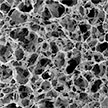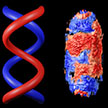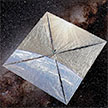Showing Spotlights 33 - 40 of 204 in category All (newest first):
 The development of efficient cooling technology based on environmentally friendly and biobased materials is crucial to many day-to-day activities. A novel, highly efficient cellulose nanocrystal aerogel radiative cooler acts as a dual-function thermal insulator and daytime passive radiant cooler. These aerogel coolers can save on average more than 35% in cooling energy consumption and they are capable of achieving a nearly 9 degree C drop under direct sunlight, they even work effectively in hot, moist, and fickle extreme surroundings.
The development of efficient cooling technology based on environmentally friendly and biobased materials is crucial to many day-to-day activities. A novel, highly efficient cellulose nanocrystal aerogel radiative cooler acts as a dual-function thermal insulator and daytime passive radiant cooler. These aerogel coolers can save on average more than 35% in cooling energy consumption and they are capable of achieving a nearly 9 degree C drop under direct sunlight, they even work effectively in hot, moist, and fickle extreme surroundings.
Jun 16th, 2022
 Modern sports equipment often appears to be a showcase for new material technologies and nowhere has this been more true than in global sport competitions. Some of the high-tech materials used by athletes in competitive winter sports are using nanomaterials. But, as the 2022 Beijing Winter Olympics has shown, other areas have benefited from nanotechnologies and nanoscience as well: ice skating, wearable monitoring devices, and even nanomaterial-based Braille printing of Olympic service manuals and spectator guides for vision impaired readers.
Modern sports equipment often appears to be a showcase for new material technologies and nowhere has this been more true than in global sport competitions. Some of the high-tech materials used by athletes in competitive winter sports are using nanomaterials. But, as the 2022 Beijing Winter Olympics has shown, other areas have benefited from nanotechnologies and nanoscience as well: ice skating, wearable monitoring devices, and even nanomaterial-based Braille printing of Olympic service manuals and spectator guides for vision impaired readers.
Apr 25th, 2022
 We have created two inaugural Nanowerk non-fungible token (NFT) collections in a series we are calling Giants of Nanotech in order to honor the great minds of science in this field. The digital artwork has been created using the artificial intelligence (AI) image creation algorithm Neural Style Transfer. The NFTs are tokenized on the Polygon Blockchain as a collectible on the OpenSea marketplace. Have fun with our NFTs and please remember, your purchase helps fund Nanowerk and we are very grateful to you!
We have created two inaugural Nanowerk non-fungible token (NFT) collections in a series we are calling Giants of Nanotech in order to honor the great minds of science in this field. The digital artwork has been created using the artificial intelligence (AI) image creation algorithm Neural Style Transfer. The NFTs are tokenized on the Polygon Blockchain as a collectible on the OpenSea marketplace. Have fun with our NFTs and please remember, your purchase helps fund Nanowerk and we are very grateful to you!
Apr 10th, 2022
 Researchers have developed a novel technique to quantify the helical morphology of gold chiral nanorods. Such nanoparticles exhibit unique properties in a sense that they can change the circular polarization of light. In many cases, these properties are believed to be caused by the helical (or 'screw-like') morphology of the nanoparticles, but until now it was very difficult to objectively analyze their shape. This methodology is the first building block towards a fundamental understanding of the chiroptical activity of nanoparticles.
Researchers have developed a novel technique to quantify the helical morphology of gold chiral nanorods. Such nanoparticles exhibit unique properties in a sense that they can change the circular polarization of light. In many cases, these properties are believed to be caused by the helical (or 'screw-like') morphology of the nanoparticles, but until now it was very difficult to objectively analyze their shape. This methodology is the first building block towards a fundamental understanding of the chiroptical activity of nanoparticles.
Mar 10th, 2022
 Adapting the concept of interstellar laser sailing for Earth orbital maneuvering and solar system exploration, researchers propose that the fundamental advantages of laser propulsion are manifested at much smaller laser powers in applications where conventional electric and chemical rockets are traditionally utilized. This approach makes use of low-power lasers, which are available already today, and novel light sail nanomaterials. These lasers push small, cell phone sized probes to velocities and destinations that are beyond the reach of current technologies, such as ever bigger chemical rockets being built or state-of-the-art ion engines.
Adapting the concept of interstellar laser sailing for Earth orbital maneuvering and solar system exploration, researchers propose that the fundamental advantages of laser propulsion are manifested at much smaller laser powers in applications where conventional electric and chemical rockets are traditionally utilized. This approach makes use of low-power lasers, which are available already today, and novel light sail nanomaterials. These lasers push small, cell phone sized probes to velocities and destinations that are beyond the reach of current technologies, such as ever bigger chemical rockets being built or state-of-the-art ion engines.
Feb 2nd, 2022
 This article discusses the use of nanotechnology in lubricants. Nanoparticle additives show significant enhancements in lubricant attributes like anti-oxidation capability, tribological features, and thermal properties. Nanotechnology offers the possibility of using nanosized additives to increase the performance of lubricating oil. The addition of nanoparticles to conventional base oils is a promising method for improving properties like friction and wear resistance in instruments.
This article discusses the use of nanotechnology in lubricants. Nanoparticle additives show significant enhancements in lubricant attributes like anti-oxidation capability, tribological features, and thermal properties. Nanotechnology offers the possibility of using nanosized additives to increase the performance of lubricating oil. The addition of nanoparticles to conventional base oils is a promising method for improving properties like friction and wear resistance in instruments.
Jan 26th, 2022
 Being a relatively young field, Bionanotechnology is often neglected within undergraduate and postgraduate curriculum. With an increasing number of researchers and professionals of different backgrounds coming into the field, there is a clear need to have learning platforms that cover techniques, strategies and methods that characterise the design of bionano structures. In September 2021, Cambridge Advance Online, a new educational initiative created between the University of Cambridge and Cambridge University Press and Assessment, launched a 6-week online course about Bionanotechnology: Bionanotechnology from Theory to Practice.
Being a relatively young field, Bionanotechnology is often neglected within undergraduate and postgraduate curriculum. With an increasing number of researchers and professionals of different backgrounds coming into the field, there is a clear need to have learning platforms that cover techniques, strategies and methods that characterise the design of bionano structures. In September 2021, Cambridge Advance Online, a new educational initiative created between the University of Cambridge and Cambridge University Press and Assessment, launched a 6-week online course about Bionanotechnology: Bionanotechnology from Theory to Practice.
Jan 11th, 2022
 The development of smart cities is linked to the development of new materials and devices, the use of sensor networks, the handling of huge amounts of data, the development of communication networks between objects, decision-making, and a range of other smart technologies. Many of these areas benefit from nanotechnology enabled materials and devices such as sensors, photovoltaics, efficient lighting systems or communication networks.
The development of smart cities is linked to the development of new materials and devices, the use of sensor networks, the handling of huge amounts of data, the development of communication networks between objects, decision-making, and a range of other smart technologies. Many of these areas benefit from nanotechnology enabled materials and devices such as sensors, photovoltaics, efficient lighting systems or communication networks.
Nov 30th, 2021
 The development of efficient cooling technology based on environmentally friendly and biobased materials is crucial to many day-to-day activities. A novel, highly efficient cellulose nanocrystal aerogel radiative cooler acts as a dual-function thermal insulator and daytime passive radiant cooler. These aerogel coolers can save on average more than 35% in cooling energy consumption and they are capable of achieving a nearly 9 degree C drop under direct sunlight, they even work effectively in hot, moist, and fickle extreme surroundings.
The development of efficient cooling technology based on environmentally friendly and biobased materials is crucial to many day-to-day activities. A novel, highly efficient cellulose nanocrystal aerogel radiative cooler acts as a dual-function thermal insulator and daytime passive radiant cooler. These aerogel coolers can save on average more than 35% in cooling energy consumption and they are capable of achieving a nearly 9 degree C drop under direct sunlight, they even work effectively in hot, moist, and fickle extreme surroundings.
 Subscribe to our Nanotechnology Spotlight feed
Subscribe to our Nanotechnology Spotlight feed





